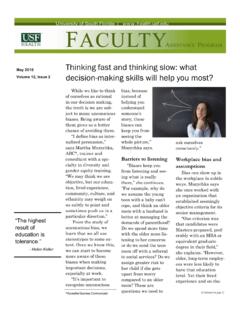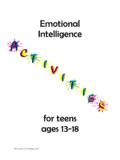Transcription of Emotional Intelligence in the Workplace - Wood & Associates
1 August 2013 Volume 7, Issue 3 People who perceive emotions accurately (both in themselves and others) better understand difficult situations. - Travis Bradberry, Emotional Intelligence in the Workplace Adding Emotional Intelligence to your toolkit of success skills might be the most important thing you can do for your career. Emotional Intelligence , or EQ, matters more than intellect alone, and it has practical value in the Workplace . Emotional Intelligence is the skill of understanding and managing your emo-tions and also understanding the emotions of those around you, says executive coach, consultant and speaker Irene Becker, who works with clients world-wide.
2 High Emotional Intelligence is reflected in self awareness, self manage-ment, motivation, empathy and social/communication skills. In Working with Emotional Intelligence , author Daniel Goleman, , CEO of Emotional Intelligence Services, calls EQ a different way of being smart. Essential for leaders Organizations are abso-lutely beginning to require their leaders to demonstrate these skills in order to be hired and promoted, says Travis Bradberry, , President, TalentSmart, Inc., which provides Emotional Intelligence coaching, training and assessment services. This practice is far from reaching its peak, however, and many organizations shoot themselves in the foot by hiring and promoting people without looking at the whole picture.
3 As a result, most are late to the game in working to develop EQ skills once lead-ers are on board. Sorting out complex issues People who perceive emotions accurately (both in themselves and others) better understand difficult situa-tions, says Bradberry. This includes where people are coming from, why they re doing what they re doing, and how their own behavior is holding them back. Emotion is a primary driver of human behavior. When you re blind to it, the world is a difficult and confusing place. Build and practice EQ Leaders today need to listen, learn and communi-cate across diverse groups, internal and external con-stituencies, says Becker. She cites four barriers to building EQ skills: 1.
4 Not understanding the importance of building high Emotional intelli-gence. 2. Lack of desire or inter-est in building high Emotional Intelligence . 3. Lack of self awareness about one s need to build higher Emotional Intelligence . 4. A bias or fear because of the term Emotional Intelligence , and what they think is required to build this skill. (Continued on page 2) Emotional Intelligence in the Workplace P a g e 2 V o l u m e 7 , I s s u e 3 F a c u l t y A s s i s t a n c e P r o g r a m N e w s l e t t e r Your Faculty Assistance Program: A Caring, Confidential Resource (813) 871-1293 (800) 343-4670 We care about your wellbeing on and off the job. Your Faculty Assistance Program (FAP), administered by the professionals at Wood & Associates , is a confidential resource you can rely on, 24/7, when you need an assist during times of change, stress or crisis.
5 This service is a faculty benefit. We re also a resource for helping you grow personally and professionally. The FAP newsletter is provided as a benefit to USF Health faculty. We welcome your comments on newsletter topics, however, we cannot provide FAP services by email. Gary L. Wood & Associates , 4700 N. Habana Avenue Suite 300 Tampa, FL 33614 Editor Patricia N. Alexander, Writer Susan H. Burnell, APR There can be no knowledge without emotion. We may be aware of a truth, yet until we have felt its force, it is not ours. To the cognition of the brain must be added the experience of the soul. Arnold Bennett, British novelist (1867-1931) There has to be an inner desire to learn and im-prove, Becker explains.
6 You can t make a fire with wet wood. When some people hear the term Emotional Intelligence , it scares them. They think it might be like going through psy-chotherapy, and it s not. (Continued from page 1) Emotional Intelligence train-ing is not psychotherapy. Its focus is on powerful and practical skills that anyone can use to improve their personal or professional lives. Learn and practice EQ training can be done effectively in a group setting or with individual coaching. Exercises may begin with a self-assessment, and then cover four key Emotional skills: self awareness self management social awareness relationship management As individuals explore their own EQ capabilities, they can then work on specific ways to apply EQ skills in the Workplace .
7 After learning EQ skills, practice them, says Bradberry. When you begin developing new Emotional Intelligence skills, you need to practice new behaviors long enough to make them habitual. The brain loves efficiency and it will only provide the neuronal plasticity needed to support new behavior when you repeat that behav-ior over and over again. Any situation in which you have human contact is a practice zone for EQ, adds Becker. Engage and empathize The need to use every communication to build trust, transparency of com-munication and engagement cannot be underestimated, Becker says. Emotional Intelligence requires a balance of firmness and caring, authenticity and empathy.
8 Those skills must be learned and honed. Responding to Workplace Conflicts with EQ Workplace conflicts covert and overt demand high emo-tional Intelligence skills, says executive coach Irene Becker. Approximately 40 percent of employee turnover is due to disa-greements between an employee and his or her boss. When emo-tional Intelligence and communication skills are lacking, turmoil builds. That translates into a disengaged workforce or job dissatis-faction that leads to high turnover. One of the most common problems is a communication style that undermines retention, creates disengagement and fo-ments conflict, Becker notes. A leader who has not developed EQ skills is less able to gauge the needs, wants and expectations of those they lead.
9 This individual may be focused on the task at hand, and communicate in a style of manner that may be very appropriate for them, but does not engage the other party at all. If a leader is speaking to closed ears, whatever they say is irrelevant. Becker cites the example of one of her coaching clients, a 45-year-old manager who had poor communication skills and a low level of Emotional Intelligence . It became such a problem that her entire staff walked out, Becker recounts. She knew she wasn t a communicator, and she finally realized that she needed to improve or she would jeopardize her whole department s success. With some coaching, she developed a better awareness of her own and others emotions.
10 She is now an excellent communicator and a more successful leader. Resources: Irene Becker Emotional Intelligence at Work Self-Test Emotional Intelligence by Daniel Goleman (1995), Bantam Dell, New York, NY Working with Emotional Intelligence by Daniel Goleman (1998), Bantam, New York, NY Emotional Intelligence by Travis Bradberry and Jean Greaves (2009), TalentSmart, San Diego, CA TalentSmart


